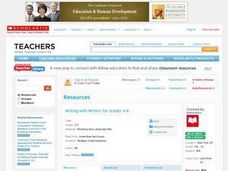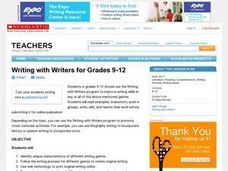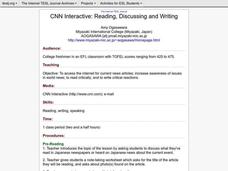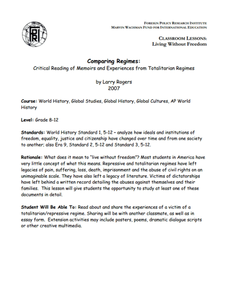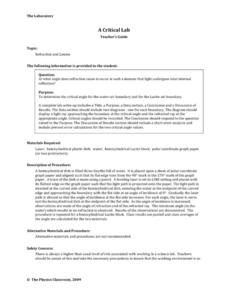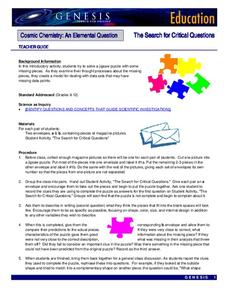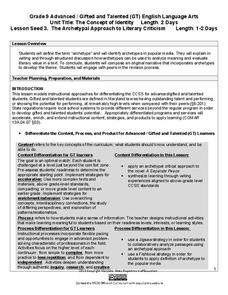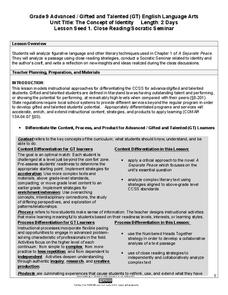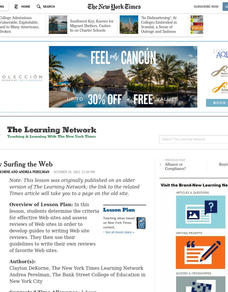Curated OER
Critical Thinking With Fables New and Old
Explore the fables of today along with Aesop's ancient fables. Learners will understand the structure of a fable, critically think about the fable's message, and create a lesson that they would like to teach through a fable. Suggested...
Curated OER
Write with Writers
Write and work with authors on the Scholastic Website to promote the recognition of various genres. Young writers will participate in activities based on the type of writing such as biography, descriptive, folktales, mystery, news, and...
Urban Ministry
Interactive Read Aloud
Learning how to deliver good literacy instruction is key to becoming a successful teacher. This resource isn't so much a lesson as it is a guide to leading children in an interactive read-aloud session to increase fluency, comprehension,...
Curated OER
Writing with Writers for Grades 9-12
Have your class examine the characteristics of various writing genres using the Writing with Writers online project. Detailed instructions for how to introduce, discuss, and develop a piece of writing for each genre are included. Class...
Curated OER
CNN Interactive: Reading, Discussing and Writing
Students access the internet for current news articles; increase awareness of issues in world news; to read critically; and to write critical reactions.
Curated OER
Reading a Comparison-Contrast Essay
Turn your passive readers into active readers with an engaging lesson plan on reading informational text. Focused on compare and contrast structured essays, the activity prompts elementary learners to jot down questions and think-aloud...
Scholastic
Reading Characters
Philip Pullman's The Golden Compass provides the text for a study of how writers bring characters to life. Using the provided character mapping worksheets, readers respond to questions and then write a short character sketch.
Curated OER
What's My Point: Persuasive Writing
Why do readers need to know an author’s purpose? How do you figure out what that purpose is? Guide your pupils through a series of activities that show them how to identify various techniques and structures used in persuasive writing....
Foreign Policy Research Institute
Comparing Regimes: Critical Reading of Memoirs and Experiences from Totalitarian Regimes
Can you imagine living in a totalitarian country? Learners will read several primary source memoirs to gain a deeper understanding of what life is like under a controlled government. They'll discuss each piece in pairs, research...
Physics Classroom
A Critical Lab
Physics lab groups finagle with laser lights to determine the critical angle of refraction for both water and Lucite. Because there are no detailed steps or an answer key for this enlightening exercise, an inexperienced physics...
Maine Content Literacy Project
Introduction to Literacy Criticism
As learners continue to examine a short story of their choice, they take some time to look at analysis completed by others on the same story. In the eleventh lesson in a series of fourteen, pupils explore various sites for literary...
NASA
The Search for Critical Questions
A puzzle isn't about the individual pieces, but how they work together. Scholars assemble a puzzle and discover missing pieces. They write a description of what they expect these pieces to look like, including as many details as...
Maryland Department of Education
The Concept of Identity Lesson 3: The Archetypal Approach to Literary Criticism
As class members continue their study of approaches to literary criticism, readers examine the symbolism and archetypal patterns in John Knowles' A Separate Peace, and how these parallels are used to develop a theme in the story.
Maryland Department of Education
The Concept of Identity Lesson 1: Close Reading/Socratic Seminar
John Knowles' A Separate Peace provides readers with an opportunity to develop their close reading and analytical skills as they look for what Knowles feels are the factors that shape our identity.
Curated OER
Critically Surfing the Web
The New York Times article “Online Diary,” launches this study of websites and how to assess them. Richly detailed, the lesson plan includes warm-up activities, procedures, journal prompts, discussion questions, and links to valuable...
National Endowment for the Humanities
Emulating Emily Dickinson: Poetry Writing
High schoolers analyze mood and voice in Emily Dickinson's poem, "There's a Certain Slant of Light." After the analysis, students write a poem of their own emulating the Dickinson poem, and then write a one-page essay describing what...
Novelinks
Touching Spirit Bear: Question Answer Response Strategy
What types of questions help readers learn the most? Sixth, seventh, and eighth graders learn how to ask four types of questions from the Question Answer Response (QAR) reading strategy to help grow their comprehension of Touching Spirit...
Roald Dahl
The Twits - Muggle-Wump Has an Idea
If a bar of chocolate was on the floor, would you try to pick it up? What if it was covered with glue? The eighth lesson plan in an 11-part unit designed to accompany The Twits by Roald Dahl has scholars imagine crazy scenarios. The...
Curated OER
Writing Fables
Students write their own fables. In this writing fables lesson, students use handheld computers to write a fable. The class designs a spreadsheet to organize common elements of fables. Students also edit each others' work.
Geography 360°
Poetry Writing
Put the tips and tricks in this guide into practice in order to encourage your pupils to blossom into poets. A wonderful reference material for teachers, this packet includes definitions of poetic terms and forms as well as step-by-step...
Maryland Department of Education
The Concept of Identity Lesson 2: The Historical/Biographical Approach
"How does our environment shape our identity?" After researching biographical information about John Knowles and considering how these experiences are reflected in A Separate Peace, class members consider the strengths and weaknesses of...
Media Smarts
Kellogg Special K Ads
Foster class discussion about body image with the resources and questions provided here. Focus on Special K's "look good on your own terms" ad campaign. Learners start by reading about this campaign and analyze a series of print ads,...
Novelinks
The Tempest: QAR
Asking questions about a text is an effective way to improve reading comprehension. Apply the Question Answer Response strategy to your unit on William Shakespeare's The Tempest. As kids read each passage, they decide if the answer can...
Maine Content Literacy Project
Process of Reading
Assist your pupils with literary analysis by discussing and exploring theme. This plan, the twelfth in a series of fourteen, builds in some time to explore theme as a class. Learners also blog about the main event in their stories and...



